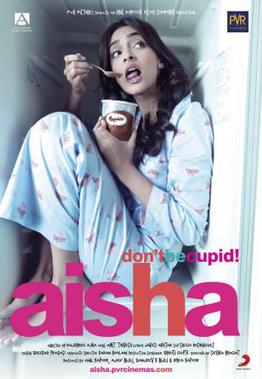Emma through the lens of Aisha
 I just watched Aisha, a Bollywood take on Jane Austen’s Emma, and while I can’t say it was a great movie (although I did enjoy it), it was certainly an interesting lens through which to view the novel.
I just watched Aisha, a Bollywood take on Jane Austen’s Emma, and while I can’t say it was a great movie (although I did enjoy it), it was certainly an interesting lens through which to view the novel.
And so I find myself objecting to the characterization of Emma in both Aisha and the 1995 Clueless as a fast driving, materialistic, fashion obsessed Valley (or Delhi) girl. As Jane Austen described her, I don’t get the impression of a young woman who flaunts her wealth. Admittedly Emma has few opportunities to flaunt it in Highbury and perhaps if she had a proximity to Rodeo Drive and a credit card, she would be a material girl, but there is little evidence of that in Austen’s novel.
Emma Woodhouse certainly is aware of her station in society, but she’s not so ruled by it that she isn’t hurt when she fails to get an invitation from the Coles after everyone else has received theirs. And when she does receive it, she is happy to attend. And she is snob enough to think Robert Martin not a fit match for Harriet Smith, but not so snobbish that she won’t befriend this same Harriet Smith, natural daughter of nobody.
But back to Aisha, the 2010 movie which stars Sonam Kapoor as Aisha Kapoor (the Emma character); Abhay Deol as Arjun Burman (George Knightley); Amrita Puri as Shefali Thakur (Harriet Smith); Cyrus Sahukar as Randhir Ghambir (roughly comparable to Mr. Elton); and Arunoday Singh as Dhruv Singh (roughly comparable to Frank Churchill). The movie roughly follows the plot of Emma, with the significant differences that Mr. Kapoor (Mr. Woodhouse) is not a valetudinarian (hypochondriac) and consequently Aisha does not need to worry about abandoning him; the Mrs. Weston née Taylor character is replaced by Aisha’s aunt Chitra, played by Anuradha Patel, who marries Col. Singh, played by Yuri Suri; and Aisha also has a best friend Pinky Bose, played by Ira Dubey.
It was also fun to watch the film and try to suss out which characters correspond to the characters in Emma. Mr. Elton is especially hard to determine because Randhir has our sympathies. Dhruv is also difficult as he really doesn’t have the charm of Frank Churchill.
The introduction of a best friend character for Emma is similar to Clueless, which also gave the Emma character of that film — Cher Horowitz — a best friend in Dionne Davenport. Pinky Bose, however, plays a more important role in Aisha than the best friend in Clueless, as she gets to pick up the pieces left over from Aisha’s attempt to hook up Shefali and Randhir (Harriet and Mr. Elton).
What I did appreciate in Aisha is that the central complaint of Emma … I mean Aisha … is that her self-absorption is so clearly explained by both Shefali and Arjun. Arjun tells Aisha that she’s succeeded in making Shefali as shallow as herself; and Shefali accuses Aisha as treating her as little more than a project, a divertissement. And in the context of the film, those accusations may be justified.
But in Austen’s novel, I think those accusations either unwarranted or unncessarily harsh. Perhaps being myself a person who was in service to a parent, I have a sympathy for Emma’s obligations to her father. After all, at the moment of her greatest happiness, she was willing to forgo that happiness if it meant leaving her father alone. Self absorbed she may be, but she does think of others before herself.
And if we condemn her unkind words to Miss Bates on Box Hill, surely we should give her some credit for all the time she suffers her father’s complaints or nods amiably to Miss Bates going on at length about Jane Fairfax.
It’s true that Emma treated Harriet as a pet project and that she was less than kind to Jane Fairfax upon first meeting, but the bulk of her behavior towards them was exemplary. And finally my main reason for not thinking ill of Emma is that everyone in the book adores her. She can’t be that shallow, selfish or clueless if that many people — her father, Knightley, Mrs. Weston, Mr. Weston, Miss Bates, Frank Churchill, etc. — like her and esteem her. So I’d appreciate seeing a modern-day Emma that doesn’t treat her as a spoiled rich girl and that truly recognizes her real faults and not those that are easily parodied.
